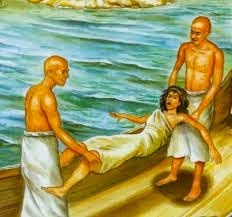Compiled by: Kandiah Thillaivinayagalingam]-
 Other than famous
Nin-dada case,We found another case from the same period.A man named Irra-malik
came home to find his wife,Ishtar-Ummi,making love with another man.Rather than
commit violence on the spot,Irra-malik kept his head.He tied Ishtar-Ummi and
her lover to the bed with rope and dragged them to the assembly for trial.
Other than famous
Nin-dada case,We found another case from the same period.A man named Irra-malik
came home to find his wife,Ishtar-Ummi,making love with another man.Rather than
commit violence on the spot,Irra-malik kept his head.He tied Ishtar-Ummi and
her lover to the bed with rope and dragged them to the assembly for trial.
Although the case
record is short in details,It appears that the assembly
took the evidence in front of them-the two lovers tied and wriggling on the bed-as proof that adultery had taken place.The assembly first ruled that her pubic hair be shaven-Whether this was merely to humiliate her or to prepare her for a life time slavery,We do not know.It make sense that adultery should have been forbidden,as husband wanted to be assumed that their children were actually their own.As far back as the sumerian kingdom of Eshnunna,in about 1770 BC,no forgiveness was permitted.The day, a wife,is seized in the lap of another man,she shall die,she will not live.However later mesopotamian cultures allowed husbands to parden their wayward wives.
took the evidence in front of them-the two lovers tied and wriggling on the bed-as proof that adultery had taken place.The assembly first ruled that her pubic hair be shaven-Whether this was merely to humiliate her or to prepare her for a life time slavery,We do not know.It make sense that adultery should have been forbidden,as husband wanted to be assumed that their children were actually their own.As far back as the sumerian kingdom of Eshnunna,in about 1770 BC,no forgiveness was permitted.The day, a wife,is seized in the lap of another man,she shall die,she will not live.However later mesopotamian cultures allowed husbands to parden their wayward wives.
Rivers were also
involved when wives were accused adultery without solid proof. Here woman could
clear herself of suspicion by having herself thrown into the water.If she
survived,she was declared innocent.If she sank,she was guilty.In one case that
unfolded in the sumerian kingdom of Mari,an unnamed woman made a detailed
public statement just before the start of her "River Ordeal".She
declared that she had indeed had sex with a father and his son before marrying
the father. After her wedding,while her husband was away,the son came back to
her to demand sex once again.
"He kissed me on
my lips" she reported."He touched my
reproductive organ".She insisted ,however that they never past the
heavy petting stage.Moreover she scolded her aggressive stepson for coming
after her,telling him that she would never do her, husband "unforgiveable
harm" by letting him possess her again.Her declaration reads like she
doubted that she would survive the river,but the Gods apparently believed her
story.She floated.
We also found a
peculiar methods/ordeal were used to resolve cases in the ancient Tamil
country,Here the plaintiff to thrust his
hand into a pot containing a cobra. If the cobra bit him, he was guilty and he
was sentenced: if the cobra did not bite him,
he was found innocent.
During the pakthi
movement under nayanars and alvars,We heard about "Anal vaatham"
& "Punal vaatham" too,followed by Fire Ordeal by Kambar in his
"kamba ramayanam"
Summoned by Rama,
through Hanuman, Sita arrives at the battlefield,after Rama killed Ravana.Rama
was very angry & asked Sita:
‘It was not to save you
that I bridged the sea,
cut down to their root
these rakshasas
with their
lightning-bright swords,
destroyed them utterly—
only to clear my self
of blame
I came to Lanka.
You who left me have
lived so long
eating the flesh of
living things
—sweeter to you than
amrutam—
drinking plentifully of
toddy.
Answer me now: what
feasts
will you prepare, fit
for us?"
What more should I
say?Your conduct cuts at the very root of
understanding. What can you do now but die? Or go your own way,
understanding. What can you do now but die? Or go your own way,
wherever you choose,’
said Rama,further.She summoned Lakshmana & told:"Light the
fire",for prove her faithfulness to Rama.
"Her jewels heavy
upon her breasts and arms,
she called out, ‘Lord
Agni!
If I have erred in
thought or deed
let your fury burn me!’
She turned and bowed to
her husband,
He who wears the tulasi
garland."
[Please note that she
only told "If I have erred in thought or deed",but not bodily.Also
you can find a double standard for men versus women: that women are supposed to
prove their faithfulness to men, but the behavior of absent men is never
questioned.]
Though there were no
court scene as in Silappathikaram in Sangam literature,Akananuru 256 &
262,clearly mentioned about Punishment and Sentences given by king court for
offences such as cheating a girl & a theft.respectively.
"............................................................
Despite that, it has
become gossip, which is
greater than the uproar
that arose in the
assembly of noble
people, on the day when
they tied an unjust man
to a tree branch with
tender sprouts and
poured water on his
head, a man who enjoyed
the beauty of a
young girl with a fine
forehead, and swore he
did not know her,
but the wise knew
otherwise, in
Kallūr town with
ancient fame, filled with
sugarcane fields and
groves with abundant
flowers that are
delightful to the eyes"-Akananuru 256...
PART :34 WILL FOLLOW IN NEXT WEEK



No comments:
Post a Comment